1,071 news posts

Featured news
05 Jul 2023
Migrant orangutans learn which foods are good to eat by watching the locals
By Mischa Dijkstra, Frontiers science writer An unflanged migrant orangutan male (on the left side) and an adolescent local orangutan female (on the right side) are peering at each other. Orangutan species: Pongo abelii. Image credit: Caroline Schuppli, SUAQ Project, http://www.suaq.org Researchers analyzed 30 years of observations on a total of 152 male migrant orangutans on Sumatra and Borneo and showed evidence that migrants learn about unfamiliar foods in their new home range by ‘peering’ at experienced locals: intensely observing them at close distance. Peering was most frequently seen when locals consumed foods that were rare or hard to process Orangutans are dependent on their mothers longer than any other non-human animal, nursing until they are at least six years old and living with her for up to three years more, learning how to find, choose, and process the exceedingly varied range of foods they eat. But how do orangutans that have left their mothers and now live far from their natal ranges, where the available foods may be very different, decide what to eat and figure out how to eat it? Now, an international team of authors has shown that in such cases, migrants follow the rule ‘observe, and […]

eBooks
04 Jul 2023
Frontiers ebook releases: July 2023
Download the top ebook releases from this month, including work on smart food for sustainable food systems, insights into computational sociolinguistics, findings on the collapse of avian biodiversity in the Anthropocene, and research on the future of energy efficiency. All ebooks are free to download, share and distribute. Shape the future of your field — and publish your own ebook — by editing a special collection around your research area. Learn more about Research Topics or submit your suggestion. Coronavirus Disease (COVID-19): Pathophysiology, Epidemiology, Clinical Management and Public Health Response, Volume IIEdited by Eugenie Ruth Lumbers; Thomas Rawson; Marco Iosa; Fabrizio Ricci; Zisis Kozlakidis; Longxiang Su; Catherine Ropert; Jonathan Kantor; Constantinos Tsioutis; Susan Christina Welburn; Burc Barin; Jiufeng SunPDFFrom raw MEG/EEG to publication: how to perform MEG/EEG group analysis with free academic softwareEdited by Vladimir Litvak; Arnaud Delorme; Francois Tadel; Alexandre Gramfort; Robert Oostenveld; Srikantan S NagarajanPDFThe Cultural Psychology of the COVID-19 PandemicEdited by Yulia Chentsova Dutton; Glenn Adams; Markus Kemmelmeier; Lucian Gideon ConwayPDFComputational SociolinguisticsEdited by Jack Grieve; Dirk Hovy; David Jurgens; Tyler S Kendall; Dong Nguyen; James N. Stanford; Meghan SumnerPDFCOVID-19: The Neurorehabilitation PerspectiveEdited by Thomas Platz; Giorgio Sandrini; David Charles Good; Nam-Jong PaikPDFMolecular Biomarkers for the Diagnosis, Prognosis, and […]

Featured news
04 Jul 2023
Meet a team of scientists working to prevent interplanetary pollution that could pose a threat to life on Earth and other planets
By Dr Athena Coustenis (CNRS, Paris University), Mr Niklas Hedman (UN Office for Outer Space Affairs), and Prof Peter Doran (University of Louisiana) As the search for life elsewhere in our solar system intensifies, so does the need to keep space exploration safe and sustainable. Planetary protection is, more than ever, a major responsibility for humankind. Ensuring that no alien matter is carried back to Earth by spacecraft returning from an interplanetary mission is not the whole issue, however, as planetary protection also involves making sure that the planets and other celestial bodies that we visit remain pristine, in order not to jeopardize scientific research. Formulating policies for planetary protection issues and keeping them up-to-date is the responsibility of the Committee on Space Research (COSPAR) panel on planetary protection. In an article in Frontiers in Astronomy and Space Sciences, an international group of experts affiliated with COSPAR reviewed the panel’s role, and its Planetary Protection Policy, including recent considerations regarding the Policy for the Moon, Venus, Mars and small planetary bodies. Now writing on the Frontiers news site, the panel’s leadership consisting of chair Dr Athena Coustenis and vice- chairs Niklas Hedman and Prof Peter Doran explain why this endeavor […]
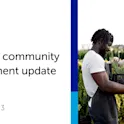
Frontiers news
29 Jun 2023
Frontiers community engagement update – summer 2023
Photo credit: Frontiers We take a moment to reflect on the information, resources, and actions taken over the past several months towards promoting longer, more prosperous lives on a healthier planet. Photo credit: Frontiers Women in Science Serving as a platform for woman researchers to share their experiences, our Women in Science blog continued to highlight the unique efforts and inspiring stories of these researchers across disciplines. The team behind Women in Science carried out insightful conversations, learning more about the meaningful work these women are doing to contribute the United Nations Sustainable Development Goals. Each blog post also captures the individual’s unique journey, complete with their biggest learnings, greatest challenges, and helpful advice for future generations. Over the past several months, readers have explored climate change through an economic lens (SDG 13), stabilization and peaceful policymaking (SDG 16), marine science and gender equality in the fisheries sector (SDG 14), and environmental philosophy and alternative hedonism (SDG 12). Photo credit: Frontiers Frontiers’ Volunteers Volunteering opportunities can come in many forms. Groups may come together to support a certain cause, while individuals can select an experience to lend their tailored skillset to. Frontiers’ volunteering platform Alaya makes it easy for all […]

Featured news
29 Jun 2023
Soft robo-glove can help stroke patients relearn to play music
By Mischa Dijkstra, Frontiers science writer The soft smart hand exoskeleton. Image credit: Dr Maohua Lin et al Researchers have developed the prototype of a comfortable and flexible ‘soft smart hand exoskeleton’ or robo-glove, which gives feedback to wearers who need to relearn tasks that require manual dexterity and coordination, for example after suffering a stroke. The present study focused on patients who need to relearn to play the piano as a proof-of-principle, but the glove can easily be adapted to help relearn other daily tasks. Stroke is the most important cause of disability for adults in the EU, which affects approximately 1.1 million inhabitants each year. After a stroke, patients commonly need rehabilitation to relearn to walk, talk, or perform daily tasks. Research has shown that besides physical and occupational therapy, music therapy can help stroke patients to recover language and motor function. But for people trained in music and who suffered a stroke, playing music may itself be a skill that needs to be relearned. Now, a study in Frontiers in Robotics and AI has shown how novel soft robotics can help recovering patients to relearn playing music and other skills that require dexterity and coordination. “Here we […]
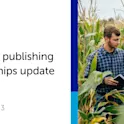
Frontiers news
28 Jun 2023
Frontiers publishing partnerships update – summer 2023
The publishing partnerships team is pleased to share the latest developments in our team alongside updates from our growing community of partners. Credit: Frontiers Responsive and efficient Our partner journals have experienced a positive start to 2023 with a rise of over 20% in submission numbers in the first six months of the year, compared to the same period last year. We’re proud to have achieved an average decision time of just 56 days from submission to decision across all partner journals, while consistently responding to partner requests for support within an average of less than two days. Our team is going the extra mile for our partners. Ahead of eligibility for PMC indexing for newly launched journals, we have provided a tailored service to support authors with self-deposition, resulting in 46 articles being indexed to date. New communications support for partners We are committed to supporting our partners to achieve their goals. As part of this commitment, we’re rolling out an enhanced communications support plan to increase awareness and visibility of our partner journals. The package includes tailored content and targeted social media support. A growing team Our publishing development team has expanded to 15 members, including one program lead, […]

Featured news
28 Jun 2023
That essential morning coffee may be a placebo
by Angharad Brewer Gillham, Frontiers science writer Image/Shutterstock.com Scientists testing coffee against plain caffeine found that plain caffeine only partially reproduces the effects of drinking a cup of coffee, activating areas of the brain that make you feel more alert but not the areas of the brain that affect working memory and goal-directed behavior. For many people, the day doesn’t start until their coffee mug is empty. Coffee is often thought to make you feel more alert, so people drink it to wake themselves up and improve their efficiency. Portuguese scientists studied coffee-drinkers to understand whether that wakefulness effect is dependent on the properties of caffeine, or whether it’s about the experience of drinking coffee. “There is a common expectation that coffee increases alertness and psychomotor functioning,” said Prof Nuno Sousa of the University of Minho, corresponding author of the study in Frontiers in Behavioral Neuroscience and Field Chief Editor of the journal. “When you get to understand better the mechanisms underlying a biological phenomenon, you open pathways for exploring the factors that may modulate it and even the potential benefits of that mechanism.” A caffeine kickstart The scientists recruited people who drank a minimum of one cup of coffee […]

Frontiers news
27 Jun 2023
Reflections on 2023 Convegno delle Stelline
Convegno delle Stelline is Italy’s only annual event for librarians and an important date in the calendar for all those with an interest in scholarly publishing. Frontiers was pleased to attend this year’s event in Milan. Credit: Frontiers Over 2,000 librarians attended this year’s conference and Frontiers participated as an exhibitor as part of the event’s Bibliostar fair. During the conference, key issues for discussion included the role of public libraries and their responsibility in promoting cultural well-being for diverse populations. Attendees also explored new technologies and strategies designed to support and facilitate structural changes, such as the transition to open access within scholarly publishing. Martina Sollai, customer experience specialist at Frontiers, said: “Our team received valuable feedback from current and prospective Italian partners, and reinforced Frontiers’ support to Italian institutions and researchers in their transition to open access publishing.” Here are answers to a few of the key questions that arose during our team’s conversations at the event: Which Italian institutions already partner with Frontiers? Frontiers collaborates with several important Italian partners who share our mission to make science open. Our agreements in Italy include public and private institutions such as the Italian Consortium of Biomedical Research Libraries – […]

Frontiers news
27 Jun 2023
Switzerland renews national deal with Frontiers
Frontiers announces that its national agreement with The Consortium of Swiss Academic Libraries (CSAL), first signed in 2022, has been renewed for another year. Credit: Frontiers The Swiss research community has once again affirmed its commitment to open access through the renewal of a national publishing deal with Frontiers. Signed by The Consortium of Swiss Academic Libraries, the agreement simplifies the publishing process for both researchers and librarians. Ronald Buitenhuis, head of institutional partnerships at Frontiers, said: “This partnership is of great importance to us. Being headquartered in Switzerland, Frontiers is delighted to continue to offer significant benefits and support to authors in our home country. We look forward to a long-term collaboration as we work together to empower researchers.” The Swiss renewal is part of Frontiers’ expanding portfolio of international deals. Other recently agreed partnerships include consortiums in the United Kingdom, Italy, Finland, Sweden, Norway, and Slovenia. In Switzerland, 15 institutions and research centers will benefit from the terms of the new agreement. New institutions can register to participate at any time and there is no annual fee to join. What are the benefits of joining the partnership? Frontiers streamlines processes for researchers and their institutions with tailored, flexible, […]
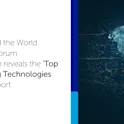
Featured news
27 Jun 2023
Frontiers and the World Economic Forum collaboration reveals the Top 10 Emerging Technologies of 2023 report
The Top 10 Emerging Technologies of 2023 report co-published by open access publisher Frontiers and the World Economic Forum has been presented today. The report identifies those technologies poised to have the biggest positive impact on society over the next three to five years. Curated by an international steering group of experts, the technologies were selected from nearly 100 contenders based on criteria including novelty, applicability, depth, and power. As this year’s knowledge partner, Frontiers collaborated with the Forum to identify experts from its far-reaching research community to provide further analysis of the technologies. Photo credit: Frontiers For more than a decade, the report has helped business leaders, innovators, policymakers, and other professionals across industries and disciplines anticipate developing technology and understand the associated risks and opportunities. The 2023 report has broadened its scope for the first time, incorporating a qualitative assessment of how each technology will impact people, the planet, prosperity, industry, and equity. These “impact fingerprints” are based on data gathered from more than 90 experts across 20 countries. They offer in-depth analysis of how the technology is predicted to influence society within the next five years. The academics were selected from Frontiers’ network of scientific journal editors, […]

Frontiers news
26 Jun 2023
Designer phages: World Economic Forum emerging technologies report
As a World Economic Forum platform partner, Frontiers is collaborating with the Forum on the 2023 edition of its annual emerging technologies report. Chosen by an international panel of experts, the list of top ten emerging technologies included in the report were selected from nearly 100 contenders based on criteria including novelty, applicability, depth, and power. Credit: Frontiers Designer phages There has been a growing recognition of the crucial role in human health played by the microbiome—the community of microbes living on and within the body. Recent advances in synthetic biology have allowed the engineering of the microbiome using phages – viruses that selectively infect specific types of bacteria. This creation of so-called designer phages has been identified by the Forum as one of this year’s top ten emerging technologies. By reprogramming phages using laboratory tools, individual bacterial species can be targeted to produce therapeutic molecules or to become sensitive to specific drugs. Mine Orlu of the steering committee for the Forum report stated: “Engineering microbiomes using designer phages represents a groundbreaking approach to improving human well-being and agricultural productivity. By reprogramming the genetic information of these viruses, scientists can selectively target specific bacteria to prevent or treat diseases in […]
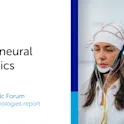
Frontiers news
26 Jun 2023
Flexible neural electronics: World Economic Forum emerging technologies report
As a World Economic Forum platform partner, Frontiers is collaborating with the Forum on the 2023 edition of its annual emerging technologies report. Chosen by an international panel of experts, the list of top ten emerging technologies included in the report were selected from nearly 100 contenders based on criteria including novelty, applicability, depth, and power. Credit: Frontiers Flexible neural electronics One of the ten technologies selected by the Forum panel are so-called flexible neural electronics. These allow electrical signals from the brain to be captured by sensor hardware and used to control machines. While neural electronics systems are already in use for treating epilepsy and in some prosthetic devices, traditional probes can cause discomfort and exhibit poor signal accuracy. Researchers have recently developed neural electronics that conform to the brain, reducing scarring and improving accuracy—vastly outperforming traditional hard probes. Flexible neural electronics could deepen our understanding of brain diseases, provide greater control of prosthetics, and boost the development of brain-monitoring devices and brain stents. Angela Wu, of the steering committee for the Forum’s report, stated: “In the realm of neural electronics, the development of flexible, biocompatible circuits represents a significant breakthrough that addresses some of the past challenges of […]
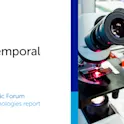
Frontiers news
26 Jun 2023
Spatiotemporal omics: World Economic Forum emerging technologies report
As a World Economic Forum platform partner, Frontiers is collaborating with the Forum on the 2023 edition of its annual emerging technologies report. Chosen by an international panel of experts, the list of top ten emerging technologies included in the report were selected from nearly 100 contenders based on criteria including novelty, applicability, depth, and power. Credit: Frontiers Spatiotemporal omics Based on the above criteria, spatiotemporal omics is one of the ten emerging technologies to be identified by the panel for inclusion in the report. Bringing together a combination of advanced imaging techniques and DNA sequencing, the technology is used to map biological process at the molecular level. Phillippe Roux, field chief editor of Frontiers in Cell Signaling, which will launch later this year and is one of the journals that has collaborated on the project, said: “Spatial omics has been identified as an emerging technology with the potential to revolutionize our understanding of biological systems. Frontiers in Cell Signaling can play a crucial role in promoting research in this area by focusing on the technical and analytical challenges in spatial omics.” In discussing the promise of spatial omics, Liz O’Day of the Forum report’s steering committee noted: “The emergence […]

Frontiers news
26 Jun 2023
AI in Healthcare: World Economic Forum emerging technologies report
As a World Economic Forum platform partner, Frontiers is collaborating with the Forum on the 2023 edition of its annual emerging technologies report. Chosen by an international panel of experts, the list of top ten emerging technologies included in the report were selected from nearly 100 contenders based on criteria including novelty, applicability, depth, and power. Credit: Frontiers AI in healthcare One of the top ten emerging technologies identified in the report, the use of AI in healthcare has come to prominence largely as a result of the weaknesses in worldwide public health systems highlighted by the COVID-19 pandemic. These technologies can enable us to anticipate and effectively address future health crises and can also help to reduce long waiting times for medical care. AI-based healthcare could particularly benefit healthcare systems in the Global South. Alongside the benefits of this technology, there are of course also challenges such as data privacy, public acceptance, and patient compliance which must be addressed. A carefully crafted ethical framework will be required for any system that curates personal data on a vast population. Despite these challenges, AI-based healthcare solutions are poised to become increasingly prevalent in the next 3–5 years. Thomas Hartung, editor-in-chief of Frontiers […]
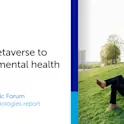
Frontiers news
26 Jun 2023
AR/VR metaverse to improve mental health: World Economic Forum emerging technologies report
As a World Economic Forum platform partner, Frontiers is collaborating with the Forum on the 2023 edition of its annual emerging technologies report. Chosen by an international panel of experts, the list of top ten emerging technologies included in the report were selected from nearly 100 contenders based on criteria including novelty, applicability, depth, and power. Credit: Frontiers AR/VR metaverse to improve mental health Mental health is widely acknowledged as one of the most pressing issues of our time. Although excessive screen and social media use have been associated with decreased mental wellbeing, AR and VR metaverse spaces are also being used to help combat the mental health crisis. This area of innovation has been selected as one of the WEF’s top ten emerging technologies this year. In considering the role the metaverse could play in mental health care, Corinna Lathan of the World Economic Forum report’s steering committee remarked: “As the mental health crisis continues to escalate, leveraging the metaverse holds immense potential for addressing this pressing public health issue. The metaverse can provide a continuum of mental healthcare services, which can both benefit patients and drive the advancement of this transformative virtual space.” The metaverse, which includes virtual […]